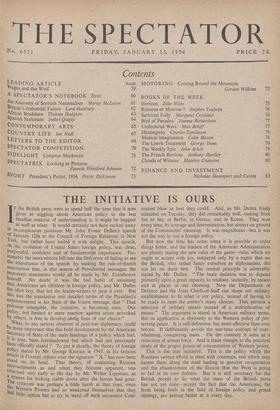THE INITIATIVE IS OURS
What, to any serious observer of post-war diplomacy, could be more important that this bold development by the American Secretary of State of the main headings of a policy which had, l i t is true, been foreshadowed but which had ribt previously been officially stated ? To put it shortly, the theory of foreign Policy stated by Mr. George Kennan in 1947, in his famous article in Foreign Affairs over the signature " X," has now been stood on its head. That theory, of containing Russian encroachments as and when they become apparent, was criticised very early in the day by Mr. Walter Lippman, as 4,, system for locking stable doors after the horses had gone. The criticism was perhaps a little harsh at that time, since the Western Powers had so weakened themselves that they had little, option but to try to ward off each successive Corn- munist blow as best they could. And, as Mr. Dulles freely admitted on Tuesday, they did remarkably well, rushing from fire to fire, in Berlin, in Greece, and in Korea. They won every time, by courage and determination, but always on ground of the Communists' choosing. It was magnificent—but it was not the way to run a foreign policy.
But now the time has come when it is possible to order things better, and the leaders of the American Administration are plainly stating the-new rules of the game—rules which we ought to accept with joy, tempered only by a regret that we the British, who rather fancy ourselves as diplomatists, did not hit on them first. The central principle is admirably stated by Mr. Dulles. " The basic decision was to depend primarily upon a great capacity to retaliate, instantly, by means and at places of .our choosing. Now the Department of Defence and the Joint Chiefs-of-Staff can shape our military establishment to fit what is our policy, instead of having to be ready to meet the enemy's many choices. That permits a selection of military means instead of a multiplication of means." The argument is stated in American military terms. But its application is obviously to the Western policy of pre- serving peace. It is still defensive, but more effective than ever before. It deliberately avoids the war-time concept of over- whelming, conquering mass. On the .contrary it aims at a reduction of armed force. And it leads straight to the practical study of the proper points of concentration of Western power.
This is the true initiative. This is the policy which the Russians cannot afford to treat with contempt, and which may hasten them along the road leading to genuine co-operation and the abandonment of the illusion that the West is going to fail in its own defence. But it is still necessary for the British people to do what the mass of the British press has not yet done—accept the fact that the Americans, far from being fools in the field of foreign policy and grand strategy, are getting better at it every day.


































 Previous page
Previous page